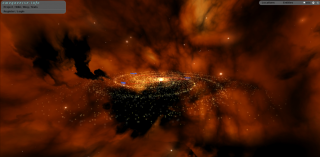Omega
| Omega | |
|---|---|
 A Universe Over IP | |
| Genre | Space RTS |
| Latest release | v0.8.2 (Announcement) |
| Release date | September 28th, 2014 |
| Developer | Independent Developers |
| Code license | AGPLv3[1] |
| Media license | GPL, CC BY-SA or public domain[2] |
| P. language | Ruby / Javascript |
| Contribute | |
| Omega is a free game. This means that the source code is available to be studied, modified, and distributed. Most projects look for help with testing, documentation, graphics, etc., as well. | |
Omega is a Universe Simulator accessible remotely by registered users over the JSON-RPC protocol.
This allows the most users and developers to access the universe and control ships / stations / other entities in via many mechanisms.
Gameplay[edit]
Omega aims to serve many purposes but one primary use case is to be a fun / challenging / expansive Space RTS that can scale indefinitely as nodes connect to each other on the Omegaverse network.
Omega provides many base RTS functionality including unit attributes and interactions, movement, combat, resource extraction, and more. The server can be expanded in any number of fashions and implements a full role based access control system allowing Omegaverse administrators to granularly enable/disable users from accessing certain entities and performing particular operations.
Clients can be written in any language and can be instrumented to perform any custom operations according to the algorithms the player / end user desires. Omega serves JSON-RPC requests over many protocols including TCP/IP, HTTP, Websockets, AMQP, and more, allowing clients to connect in the manner which works for them.
The Omega Project also ships with many various command line clients and examples as well as an interactive WebGL-based frontend that renders the running universe in real time right from the web browser.
External links[edit]
References[edit]
- ↑ https://github.com/movitto/omega#user-content-legaleese
- ↑ There is a record of every content source. This can be found along w/ the content itself in the omega-conf repo: https://github.com/movitto/omega-conf/tree/master/release/omega-content In each subdirectory there you will find a 'sources' file, listing the original source which the content came from.